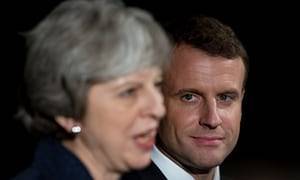Theresa May’s hopes of prising away Emmanuel Macron from the rest of the European Union to sign up to her Chequers vision for Brexit looked tenuous on the eve of the pair’s crunch talks.
But while senior Whitehall sources warned that the French president would be tough to win over, they suggested that his influence could prove vital in swaying the rest of the EU27 member states if May were successful.
The prime minister has cut short her summer break in Italy to try to convince Macron, who is seen by British officials as the biggest obstacle to her plans, to soften his approach to Brexit.
One Whitehall source claimed that France had been the most “disobliging” of the EU27 in multilateral discussions.
The EU’s chief Brexit negotiator, Michel Barnier, is viewed as unlikely to shift from his rigid approach to negotiations unless there is consensus among the most powerful EU states.
One cabinet source told the Guardian: “The French just say no to everything and, by a mile, are the most difficult ones, so if May can make progress with him that would have a disproportionately positive effect on negotiations.”
A second minister suggested Friday’s talks could be critical. “The reality is that France could be the great unblocker and can help get negotiations back on track,” the minister said. “A lot hangs on this meeting.”
The prime minister will become the first foreign leader to meet Macron at his official summer home, Fort de Brégançon, in the south of France. It will be the first time that she has spoken with him about Brexit since she struck her Chequers deal.
Although the French government has not entirely rejected the UK’s latest plan, they are understood to have deep misgivings and to have raised concerns about security cooperation, the Galileo space project and financial services in particular.
The UK has launched a diplomatic offensive, with the business secretary, Greg Clark, the foreign secretary, Jeremy Hunt, and the Brexit secretary, Dominic Raab, all meeting their French counterparts in the past week. It is part of the strategy to go over the heads of the European commission and engage with national leaders directly.
Ministers believe the Germans are more open to softening the EU’s approach, with Angela Merkel understood to be prepared to give Barnier more freedom to do a deal after a constructive meeting with May last month. However, the German chancellor has her own domestic problems to focus on.
A senior Whitehall source said: “The Germans are actually quite clear that they want to do a deal. May’s discussions with Merkel have been constructive. The Dutch have also been helpful.
“It’s the French that regularly pour cold water on everything that the British want. There’s no other nation anywhere near as disobliging. So this meeting is very important.”
On Thursday, a spokesman for the French president said Macron had full trust in Barnier and supported his reserved response to the UK plan. He added: “[Friday’s meeting] is not a substitute for the negotiations led by Michel Barnier.”
But UK ministers believe that if Macron followed Merkel in softening his approach, then Barnier, who takes his instructions from the EU governments, could adopt a more flexible approach.
“If they say we’re all happy with Chequers and we can live with it, if there’s a consensus among France and Germany in particular, that might move him [Barnier],” said one cabinet source. “If there’s no consensus, we won’t see any movement, even if individual countries are sounding positive.”
A No 10 spokesman denied the prime minister would attempt to persuade Macron to break from the shared EU position. “Its a point of view but it’s not one that we would subscribe to,” he said. However, multiple government sources suggested that was Britain’s strategy.
Lord Ricketts, who was the UK ambassador to France from 2012 to 2016, told the BBC he was pessimistic that Macron would want to break ranks, saying: “I don’t see why there is any chance of that. First of all, he does not believe in softening it. He is a passionate pro-European.
“Secondly, he is the last person to want to break ranks with what has been quite an impressively disciplined EU side. We have got to accept we have got to do the hard yards of negotiating in Brussels.”
Ricketts said British threats of a no-deal outcome was unlikely to encourage European neighbours to drop their hardline stance. “The problem with it is these crafty foreigners also read our own media and they can see how little preparation has been done and how, in effect, it’s a bluff,” he said.
Bruno Bonnell, a member of Macron’s La République En Marche party, said France was prepared to take an economic blow to protect the EU’s single market and other institutions. “Love is gone. Hopefully we can restore it but it will take time. But now it’s time for power discussions,” he said.
However, one Whitehall source claimed EU nations were “waking up” to the prospect of no deal as the deadline crept closer and the risk it could create for their own economies, as well as the UK.
More about: #Brexit
















































